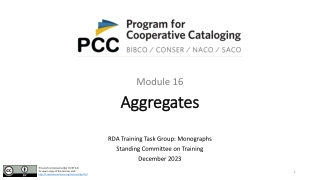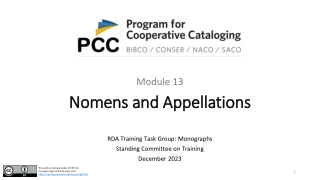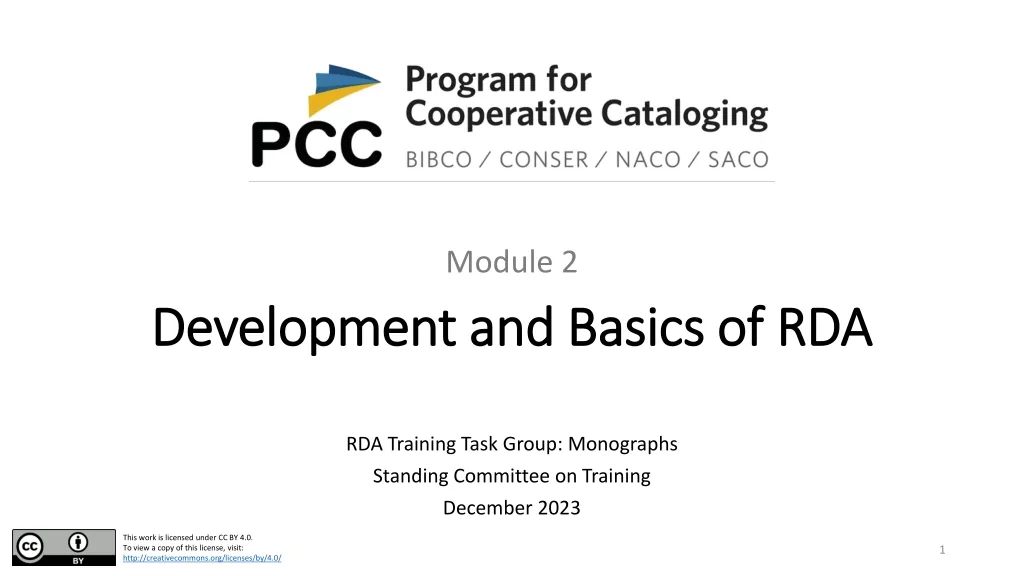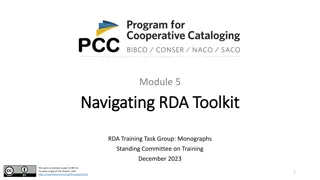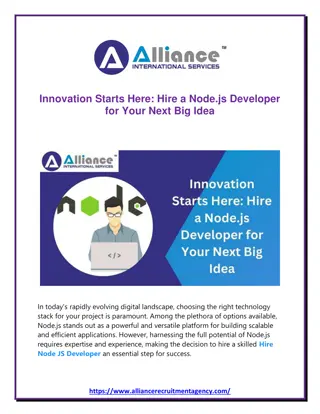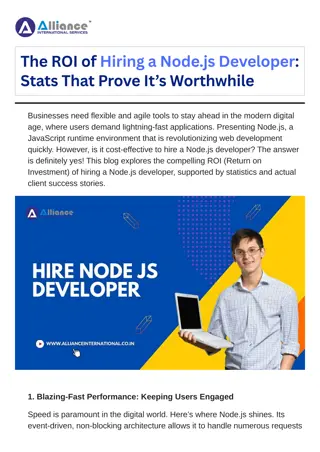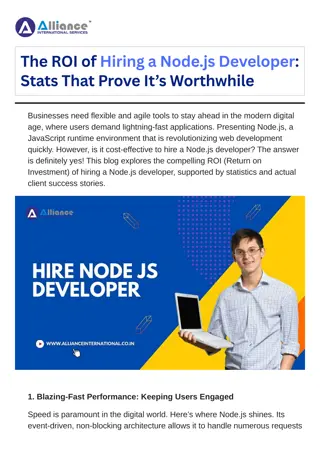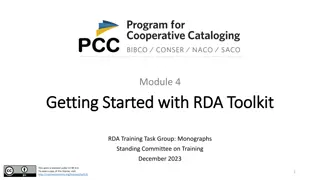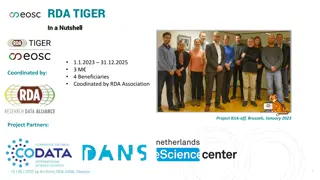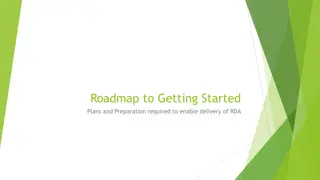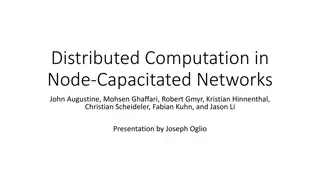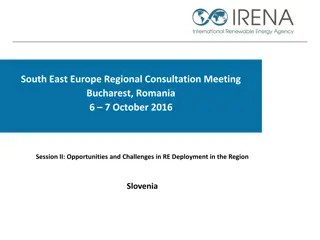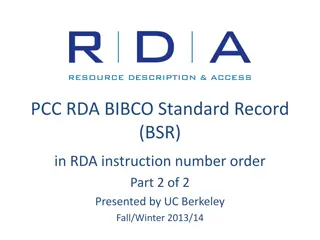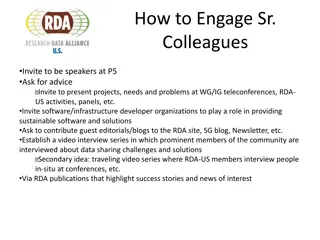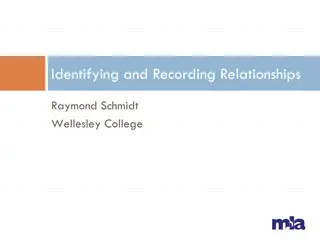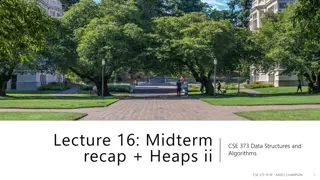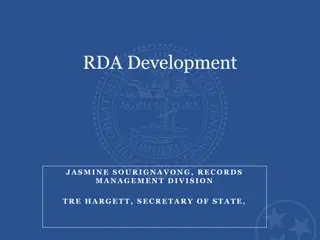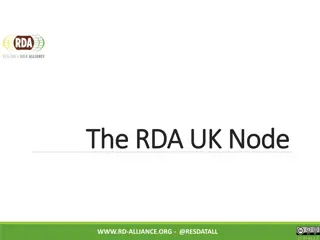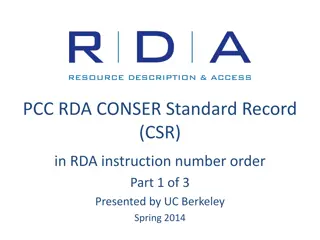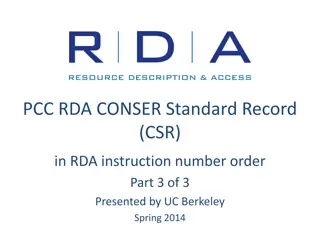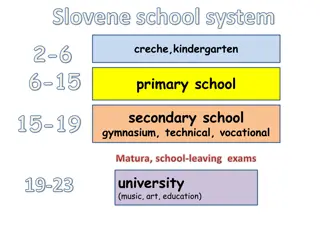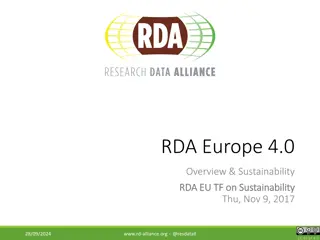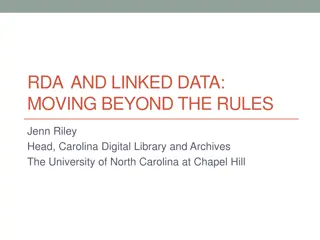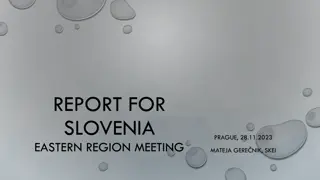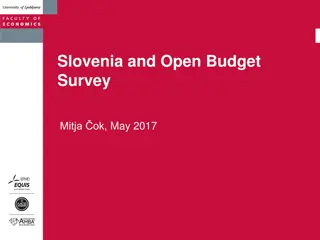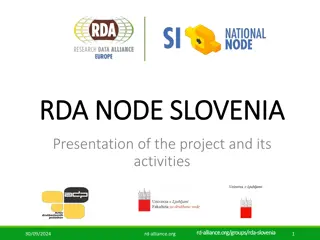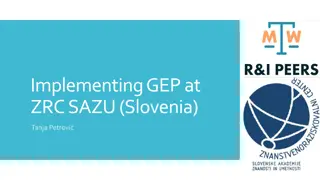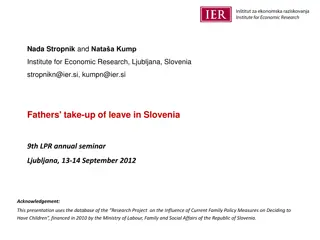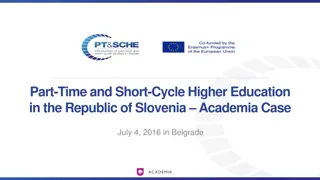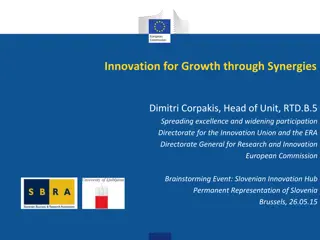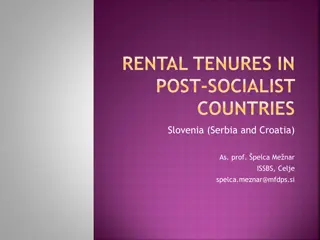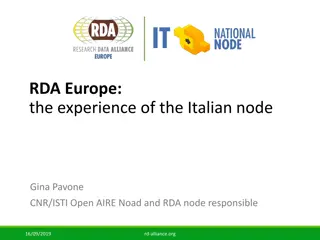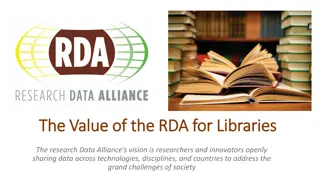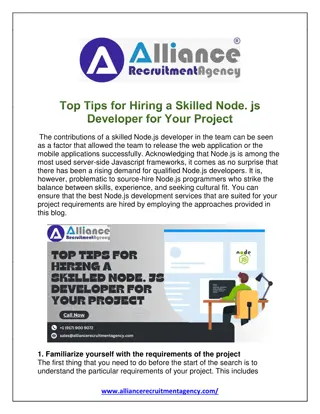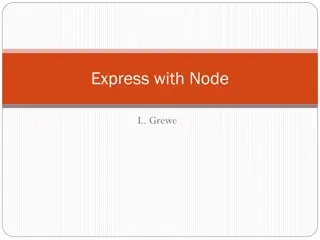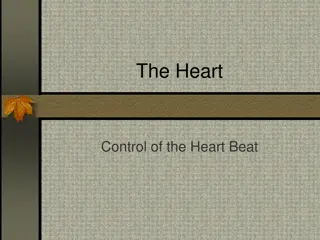Understanding Aggregates in RDA Training: A Comprehensive Overview
Explore the concept of aggregates in RDA training through this detailed module covering types of aggregates, LRM model, user-driven examples, and considerations in describing aggregates. Gain insights into collection, augmentation, and parallel aggregates with practical scenarios.
1 views • 40 slides
Understanding Nomen Entity in RDA Training Module
Explore the development of the Nomen entity in RDA training, differentiating nomen and nomen strings, identifying RDA elements for describing a nomen, and examining relationship elements linking RDA entities with nomens. Delve into the origins and attributes of nomens as defined in FRBR and FRAD sta
1 views • 48 slides
Evolution of Cataloging Standards: From Cutter's Objects of the Catalog to RDA Development
The evolution of cataloging standards reflects a rich history dating back to the 19th century, from Cutter's Objects of the Catalog to the development of official RDA. Key milestones include the 3R Project, LRM, RDA Registry, and the shift in cataloging rules driven by changing user needs and digita
5 views • 38 slides
RDA Toolkit User Guide: Navigating Module Features
Explore the comprehensive RDA Toolkit user guide to understand the basic organization, entity and element pages structure, and various features available for navigating the RDA Toolkit effectively. Learn to access and utilize Policy Statements and Metadata Guidance Documentation effortlessly.
4 views • 120 slides
Innovation Starts Here Hire a Node.js Developer for Your Next Big Idea
Discover the key benefits of hiring a Node.js developer for your project. From real-time applications to scalable solutions, unlock the power of Node.js expertise to elevate your development process and drive success.
5 views • 6 slides
The ROI of Hiring a Node.js Developer - Stats That Prove It’s Worthwhile
Explore the ROI of hiring a Node.js developer. Learn how Node.js boosts efficiency, scalability, and performance, driving better user experiences and higher conversion rates. Discover why it's a smart investment. For more information, visit: \/hire-node-js-developer. #hirenodejsdeveloper
1 views • 5 slides
The ROI of Hiring a Node.js Developer - Stats That Prove It’s Worthwhile
Explore the ROI of hiring a Node.js developer. Learn how Node.js boosts efficiency, scalability, and performance, driving better user experiences and higher conversion rates. Discover why it's a smart investment. For more information, visit: \/hire-node-js-developer. #hirenodejsdeveloper
0 views • 5 slides
Accessing and Logging In to the RDA Toolkit
Explore the RDA Toolkit, an integrated online product for cataloging-related resources. Learn how to access and log in through IP authentication or institution login to create a user profile effectively.
1 views • 18 slides
Overview of Policy Service Node (PSN) Architecture
The Policy Service Node (PSN) architecture consists of various key components such as Policy Administration Node (PAN), Monitoring Node (MnT), Inline Posture Node (IPN), and Multi-Function Node. These components work together to enable efficient policy management and network monitoring within a netw
1 views • 5 slides
RDA TIGER - Internationalization Support for Research Data Alliance Working Groups
RDA TIGER, through its services, facilitates the internationalization of EOSC developments by supporting Research Data Alliance Working Groups. It provides assistance in initiating and running WG, engaging international partners, communicating activities, offering small grants, and helping create im
0 views • 7 slides
Role of Lymphadenectomy in Genital Malignancies
Pelvic and paraaortic lymph node evaluation is crucial in the surgical staging of gynecological malignancies. The goals of lymph node dissection are to determine disease extent and guide further treatment. Pelvic lymph nodes include common iliac, external and internal iliac, obturator, sacral, and p
0 views • 16 slides
Roadmap to Enable RDA Delivery: Plans and Preparation
Decision-making framework, journey consultation, phased return preparation, ongoing review, communication strategies for volunteers and participants, and key steps required by RDA National Office to ensure safety and compliance before riders can return on site are detailed in this comprehensive road
0 views • 9 slides
Distributed Computation in Node-Capacitated Networks
Exploration of communication primitives and algorithms in node-capacitated networks, including Node-Capacitated Clique Model, communication on butterfly networks, orientation using Boruvka's algorithm, computing O(a)-orientation, and solving graph problems like BFS trees, maximal independent set, ma
0 views • 7 slides
Renewable Energy Deployment in Slovenia: Achieving Targets and Overcoming Challenges
The content provides insights into Slovenia's progress in renewable energy deployment, focusing on achieving targets and combating challenges. It covers topics such as renewable energy targets, sectoral goals, RES utilization, and the role of various renewable sources in the country. Statistical dat
0 views • 19 slides
Understanding BSR, RDA, and UC Berkeley Policy Statements
Learn how to apply the BSR (PCC Core) and UC Berkeley Policy Statements to describe print textual monographs, find RDA instructions and Policy Statements, distinguish differences between AACR2 rules and RDA instructions, and exercise judgment in reviewing RDA copy for the local catalog. Acronyms suc
2 views • 48 slides
Cataloging Training Course Overview: FRBR, RDA, BSR
Delve into a comprehensive cataloging training course covering key topics such as FRBR concepts, RDA cataloging instructions, and BSR standards. Each day focuses on specific learning objectives to enhance your understanding of bibliographic records creation. Embrace the journey of mastering FRBR and
0 views • 84 slides
Strategies for Engaging Senior Colleagues and Research Community in RDA Initiatives
Explore a range of strategies to involve senior colleagues in RDA activities, including inviting them as speakers, seeking their advice, and featuring them in guest editorials. Engage the research community through talks, presentations, and student involvement. Utilize enabling factors like stock ma
0 views • 4 slides
Understanding Relationships in Resource Description and Access (RDA)
Delve into the intricate web of relationships between resources and persons/families/corporate bodies as outlined in RDA guidelines. Explore the roles of creators, contributors, and compilers in the creation of works, manifestations, and items. Learn about recording creator relationships in MARC fie
0 views • 39 slides
Implementing Heaps: Node Operations and Runtime Analysis
Understanding the implementation of heaps involves knowing various node operations like finding the minimum node, last node, next open space, children, and parent. The runtime analysis of heap operations such as peekMin, removeMin, and insert are crucial for optimizing performance. This recap covers
0 views • 9 slides
Efficient Records Management Practices and Procedures
Learn about Records Disposition Authorizations, Statewide RDA, Specific RDA, Retention Schedules, and the Benefits of a Retention Schedule in ensuring compliance with laws, protecting records, and reducing costs. Discover the steps to create, revise, or delete an RDA via the web app provided.
0 views • 35 slides
Overview of RDA UK Node Engagement and Activities
The RDA UK Node, funded through the RDA Europe 4 project, aims to maximize the value of UK contributions to the Research Data Alliance (RDA). It comprises various UK organizations and individuals engaged in RDA activities, liaising with EOSC projects and contributing to RDA Council and Foundation. T
0 views • 9 slides
Understanding CONSER Standard Record (CSR) in RDA Instructions
Explore the principles behind CONSER Standard Record (CSR) in RDA instructions through UC Berkeley's training materials. Learn how to apply CSR and UC Berkeley policy statements to describe textual serials and integrating resources in various formats. Discover the differences between AACR2 rules and
0 views • 77 slides
Cataloging Rules and Processes for Textual Resources in RDA
Learning objectives and training provided by UC Berkeley in Spring 2014 on applying the CONSER Standard Record and RDA instructions to describe textual serials and integrating resources in various formats. The acronym review covers core elements and differences between AACR2 rules/AACR2 version of C
0 views • 44 slides
Understanding the School Systems in Slovenia and Canada
The education systems in Slovenia and Canada differ in structure and language of instruction. In Slovenia, children attend creche, kindergarten, primary school, secondary school, and then various specialized tracks like gymnasium, technical or vocational training, before going to university. In cont
0 views • 21 slides
RDA Europe 4.0 Sustainability and Development Overview
RDA Europe 4.0 is a global forum promoting research data interoperability, providing a neutral space for collaboration among 6000+ international experts. It emphasizes problem-solving with bottom-up approaches, aiming to synchronize stakeholders on national, European, and global levels. The sustaina
0 views • 9 slides
RDA and Linked Data: Exploring Beyond the Rules
Explore the intersection of RDA and Linked Data through insightful discussions on leveraging URIs, RDF graph models, and the potential for machine interoperation of library data. Delve into the concept of encoding data in a graph format and the vast possibilities it opens up in the information commu
0 views • 16 slides
Labor Regulations Update in Slovenia Eastern Region Meeting, Prague
Presentation of key highlights from the Slovenia Eastern Region Meeting in Prague on 28th November 2023, including changes in average monthly gross earnings, labor cost index, minimum wage, and recent legislation modifications affecting labor relations and foreign worker recruitment in Slovenia.
0 views • 5 slides
Overview of Slovenia's Open Budget Index 2015
The Open Budget Survey by www.InternationalBudget.org evaluates the transparency, oversight, and public participation in government budgeting. In 2015, Slovenia's Open Budget Index score was assessed, reflecting the country's level of providing accessible budget information to the public. The survey
0 views • 16 slides
RDA Node Slovenia Project Overview
The RDA Node Slovenia project serves as a central contact point between the Research Data Alliance and stakeholders in Slovenia. The project aims to coordinate infrastructure development based on international standards, promote data sharing culture, and engage stakeholders in scientific domains. Ac
0 views • 11 slides
Implementing Gender Equality Plans at ZRC SAZU, Slovenia
One of the largest research institutions in Slovenia, ZRC SAZU, is implementing Gender Equality Plans (GEPs) to improve gender equality in research organizations. The GEP project involves piloting organizations in Greece, Tunisia, Israel, Italy, Spain, Cyprus, and Slovenia. Research and analysis of
0 views • 8 slides
Factors Influencing Fathers' Paternity Leave Usage in Slovenia
This study explores the factors affecting fathers' utilization of paternity leave in Slovenia based on a survey conducted in 2010. Factors such as child-related tasks, household work index, parental education, employment status, and settlement size were considered. Significant impacts on paternity l
0 views • 11 slides
Higher Education System in Slovenia: Part-Time and Short-Cycle Academia
Slovenia is actively involved in the Bologna process and is committed to establishing a high-quality tertiary education system. The country offers short-cycle higher education programs alongside traditional higher education, focusing on quality, employability, and mobility. With a rising number of t
0 views • 23 slides
Slovenia's R&D Success: Achieving Growth Through Innovation and Synergies
Slovenia has made significant progress in increasing research and development (R&D) intensity, positioning itself as a top performer in the EU. With a focus on stimulating innovative SMEs and public-private partnerships, the country is on track to meet its 2020 R&D intensity target. Challenges remai
0 views • 12 slides
Rental Tenures in Slovenia: Insights from Post-Socialist Countries
Slovenia exhibits a unique tenure structure with a high percentage of home ownership and specific regulations governing rental tenures. The 2003 Housing Act defines various rental types, including non-profit and market-based rentals, while legislation outlines rules on contracts, rent regulation, an
0 views • 13 slides
Italian Node's Experience in Open Science Webinar Series
Explore the journey of the Italian node led by Gina Pavone at CNR/ISTI within the RDA Europe framework. The webinar series focused on collaboration with OpenAIRE NOADs and the Italian RDA node, providing insights into Open Science-related topics, RDA themes, and fostering community engagement. With
0 views • 11 slides
Enhancing Libraries' Role Through RDA Engagement
Explore how libraries can benefit from engaging with the Research Data Alliance (RDA), including opportunities to interact with data professionals, researchers, and academics, enhance expertise, and contribute to global data interoperability solutions. Discover the value of RDA for libraries and inf
0 views • 10 slides
Top Tips for Hiring a Skilled Node. js Developer for Your Project
The contributions of a skilled Node.js developer in the team can be seen as a factor that allowed the team to release the web application or the mobile applications successfully. Acknowledging that Node.js is among the most used server-side Javascrip
0 views • 7 slides
Explore the Benefits of Using Express with Node.js
Learn how Express enhances Node.js by providing a structured project layout, simplified routing, and easier development workflow, making it a versatile choice for web and mobile applications. Discover how to set up a new Node.js and Express project and organize your code efficiently.
0 views • 72 slides
Understanding the Control of Heart Beat
The heart controls its own beat through the cardiac cycle initiated by the Sinoatrial node (SA node). This myogenic system allows the heart to contract and relax without the need for external impulses. The cardiac muscle responds to electrical waves, leading to synchronized contractions of the atria
0 views • 9 slides
Overview of RDA: Resource Description and Access
An in-depth look at RDA (Resource Description and Access), covering its origins, development by the Joint Steering Committee, transition from AACR3, and key concepts such as representation principles and data sharing beyond libraries. The test period of RDA Toolkit revealed its impact with over 10,0
0 views • 27 slides
